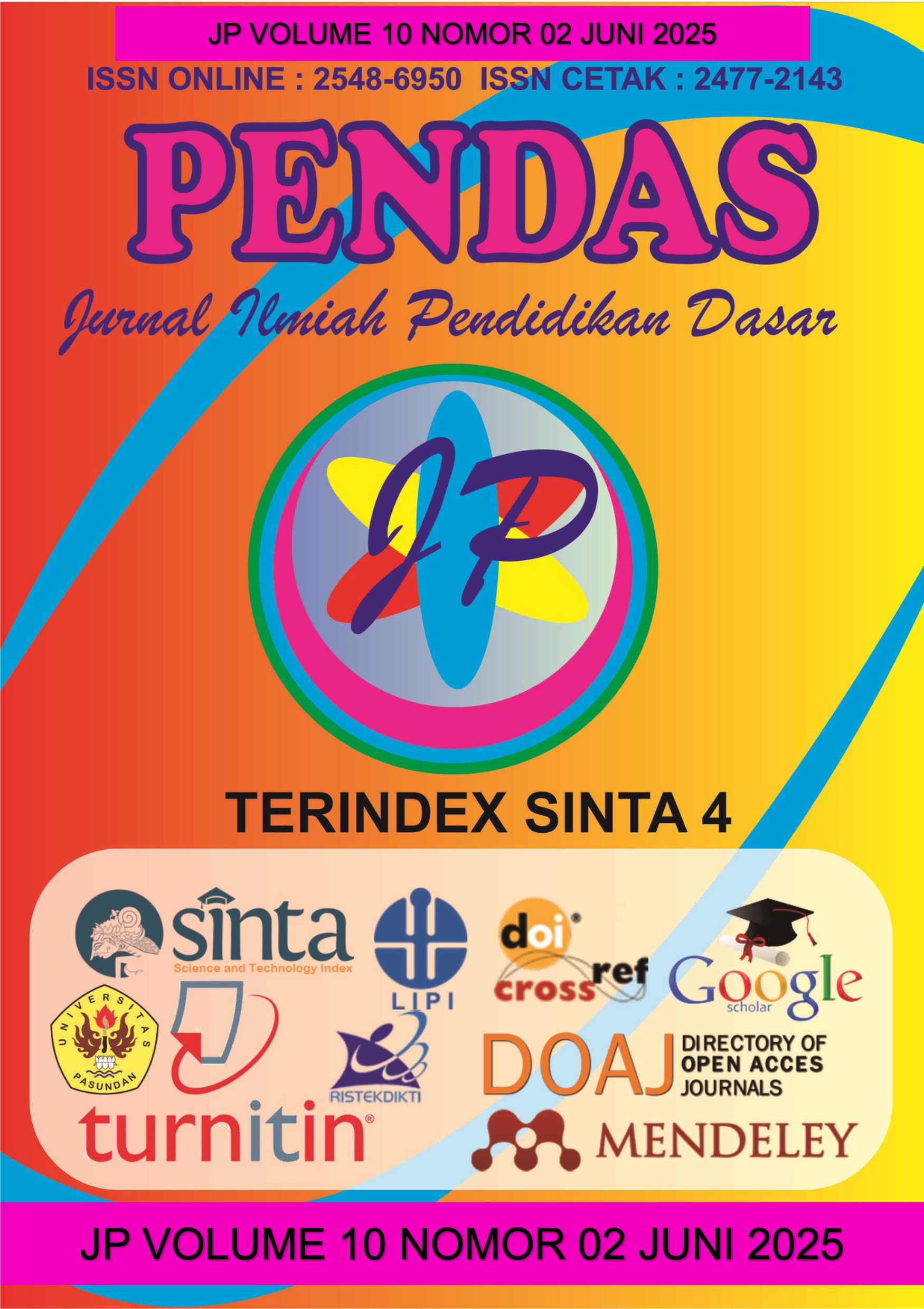INOVASI PROJECT-BASED LEARNING DALAM PEMBELAJARAN IPAS: STUDI KREATIVITAS SISWA PADA DIORAMA EKOSISTEM
DOI:
https://doi.org/10.23969/jp.v10i02.25822Keywords:
Project based learning, IPAS,, Creativity, Diorama, Ekosistem makhluk hidupAbstract
Science and Social Studies (IPAS) learning in elementary schools still faces challenges in fostering student creativity, particularly when the applied approaches do not actively engage students in contextual learning experiences. This study aims to describe the implementation of the Project-Based Learning (PjBL) model in the ecosystem topic and to analyze the forms of student creativity through a diorama project. The research employed a descriptive qualitative approach with 17 fifth-grade students of SDN 4 Mendenrejo in the 2024/2025 academic year as subjects. Data collection techniques included observation, interviews, and documentation. The study was conducted in four stages: (1) project and learning tool planning, (2) implementation of the ecosystem diorama project, (3) data collection, and (4) data analysis using Miles and Huberman’s model—comprising data reduction, data display, and conclusion drawing. The results show that the PjBL model fostered an active and meaningful learning environment. Students were directly involved in thinking, designing, and presenting their projects, which encouraged creativity in the form of original ideas, product innovation, the use of simple materials, and collaboration. A total of 94% of students demonstrated flexibility in material use, and all groups actively participated. This project not only improved students' understanding of ecosystem concepts but also enhanced creativity and 21st-century skills, making PjBL an effective and relevant approach for IPAS learning in elementary education.
Downloads
References
Allanta, T. R., & Puspita, L. (2021). Analisis keterampilan berpikir kritis dan self efficacy peserta didik: Dampak PjBL-STEM pada materi ekosistem. Jurnal Inovasi Pendidikan IPA, 7(2). https://doi.org/10.21831/jipi.v7i2.42441
Apriany, W. A., Winarni, E. W., & Muktadir, A. M. (2020). Pengaruh Penerapan Model Pembelajaran Project Based Learning (PJBL) terhadap Hasil Belajar Kognitif Siswa pada Mata Pelajaran IPA di Kelas V SD Negeri 5 Kota Bengkulu. Jurnal Pembelajaran Dan Pengajaran Pendidikan Dasar, 3(1). https://doi.org/10.33369/dikdas.v3i1.12308
Arifatin, F. W. (2023). Project-Based Learning to Enhance Students’ Creative Thinking Skill on Language Learning. Linguists: Journal of Linguistics and Language Teaching, 9/2, 260–271. https://doi.org/http://dx.doi.org/10.29300/ling.v9i2.12194
Arso Widyasmoro, Joko Sulianto, & Achmad Buchori. (2023). EFEKTIVITAS PEMBELAJARAN PROJECT BASED LEARNING BERBANTUAN E-BOOK EKOSISTEM TERHADAP KEMAMPUAN ECOLITERACY DAN KEMAMPUAN PEMECAHAN MASALAH SISWA. Didaktik : Jurnal Ilmiah PGSD STKIP Subang, 9(04). https://doi.org/10.36989/didaktik.v9i04.1714
Astuti, I. D., Toto, T., & Yulisma, L. (2019). MODEL PROJECT BASED LEARNING (PjBL) TERINTEGRASI STEM UNTUK MENINGKATKAN PENGUASAAN KONSEP DAN AKTIVITAS BELAJAR SISWA. Quagga: Jurnal Pendidikan Dan Biologi, 11(2). https://doi.org/10.25134/quagga.v11i2.1915
CHATERINE PRATAMI PUTRI, YERI SUTOPO, AGUS YUWONO, S. S. (2025). IMPLEMENTASI MEDIA PEMBELAJARAN BERBASIS PROJECT BASED LEARNING DALAM MATA PELAJARAN IPAS DI SEKOLAH DASAR CHATERINE. 4(4), 1–23.
Harizah, D. T. D., Sumarmi, & Bachri, S. (2021). Pengaruh Model Pembelajaran Project Based Learning Terhadap Kreativitas dan Hasil Belajar Geografi Siswa [The Effect of Project Based Learning Learning Model on Students’ Creativity and Learning Outcomes of Geography]. Jurnal Pendidikan: Teori, Penelitian, Dan Pengembangan, 6(5), 767–771.
Maghfiroh, I. Z., Sholihah, M., & Sofiyana, M. S. (2023). Meningkatkan hasil belajar siswa kelas V SD dengan media diorama ekosistem. Primary Education Journals (Jurnal Ke-SD-An), 3(July).
Nasution, E. Y. P., Yulia, P., & Deswita, R. (2025). Research Article A modified project-based learning model to promote students ’ creative thinking ability. https://doi.org/https://doi.org/10.33902/jpsp.202530694
Pramasdyahsari, A. S., Setyawati, R. D., Aini, S. N., Nusuki, U., Arum, J. P., Astutik, L. D., Widodo, W., Zuliah, N., & Salmah, U. (2023). Fostering students’ mathematical critical thinking skills on number patterns through digital book STEM PjBL. Eurasia Journal of Mathematics, Science and Technology Education, 19(7). https://doi.org/10.29333/ejmste/13342
Priantari, I., Prafitasari, A. N., Kusumawardhani, D. R., & Susanti, S. (2020). Improving Students Critical Thinking through STEAM-PjBL Learning. Bioeducation Journal, 4(2). https://doi.org/10.24036/bioedu.v4i2.283
Purba, L. S. L., Dasna, I. W., & Habiddin, H. (2021). Creativity in Project-Based Learning: A Systematic Literature Study. JURNAL PENDIDIKAN MIPA, 23/4, 1504–1514. https://doi.org/http://dx.doi.org/10.23960/jpmipa/v23i4.pp1504-1514
Rahardjanto, A., Husamah, & Fauzi, A. (2019). Hybrid-PjBL: Learning outcomes, creative thinking skills, and learning motivation of preservice teacher. International Journal of Instruction, 12(2). https://doi.org/10.29333/iji.2019.12212a
Septiana, A. N. I. M. A. W. (2023). Analisis Kritis Materi Ips Dalam Pembelajaran Ipas Kurikulum Merdeka Di Sekolah Dasar. Ilmiah Pendidikan Guru Sekolah Dasar, 1(1).
Sugiyono, D. (2010). Metode penelitian kuantitatif kualitatif dan R&D. In Penerbit Alfabeta.
Wenlan, L., & Jiao, Y. (2019). The impact of project-based learning on student learning outcomes: A meta-analysis. Frontiers in Psychology, 10(1202728). https://doi.org/https://doi.org/10.3389/fpsyg.2023.1202728
Wijaya, D. C., & Mustika, D. (2022). Pengembangan Media Diorama Tema Ekosistem Untuk Kelas V Sekolah Dasar. IJoIS: Indonesian Journal of Islamic Studies, 3(2). https://doi.org/10.59525/ijois.v3i2.112
Wijayanti, I. D., & Ekantini, A. (2023). IMPLEMENTASI KURIKULUM MERDEKA PADA PEMBELAJARAN IPAS MI/SD. Jurnal Ilmiah Pendidikan Dasar, 8(2).
Downloads
Published
Issue
Section
License
Copyright (c) 2025 Pendas : Jurnal Ilmiah Pendidikan Dasar

This work is licensed under a Creative Commons Attribution 4.0 International License.



















